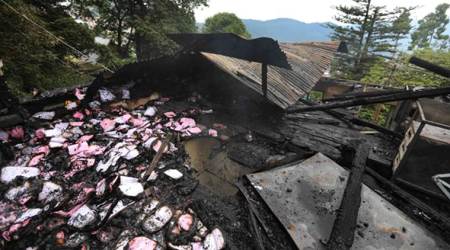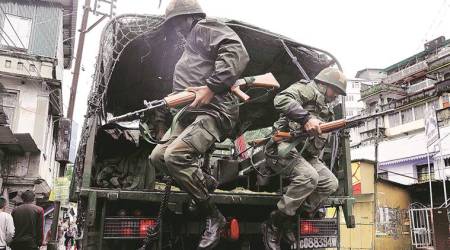 In her letter to Singh, sent last week, Mamata also “clarified” that the state government had never refused additional forces from the Centre to handle the Gorkhaland protests.(PTI Photo)
In her letter to Singh, sent last week, Mamata also “clarified” that the state government had never refused additional forces from the Centre to handle the Gorkhaland protests.(PTI Photo)
Not just Jammu and Kashmir Chief Minister Mehbooba Mufti, West Bengal CM Mamata Banerjee has also raised concerns over China with the Centre, accusing the neighbouring country of “interference” in the state. Sources said that in at least five telephonic conversations with Union Home Minister Rajnath Singh, Mamata has “discussed China in detail”.
In her letter to Singh, sent last week, Mamata also “clarified” that the state government had never refused additional forces from the Centre to handle the Gorkhaland protests.
In the letter, Mamata noted “the strategic importance” of the area known as ‘Chicken Neck’ in West Bengal, which is a narrow stretch of land that connects India’s northeastern states to the rest of India.
An official in the state Home Department pointed out, “The area is very important geo-politically. It connects Bhutan, Nepal, Bangladesh, Sikkim, Darjeeling hills, Northeast India and the rest of India. It will be a great cause of concern if China is found to be influencing the unrest in Darjeeling. In terms of the country’s foreign policy with these countries which border Bengal, the state government must be made a party by the Centre.”
The Trinamool Congress has in the past too raised concerns over China’s “growing interference” in Bengal. Last week, in an indirect reference to China, party general secretary and Parliamentary Affairs Minister Partha Chatterjee had said, “There has been support from foreign lands to the unrest in the hills, and we have definite proof of that.”
About the controversy over Central forces, Mamata told The Indian Express, “There is no question of not taking forces from the Centre. The issue doesn’t pertain to just Bengal but the entire country. But when we speak of forces, we are given reasons such as that the forces are needed elsewhere.”
On Sunday, two companies of the CRPF reached the hills while two more would be arriving on Monday in Darjeeling. The Union Home Ministry had initially sent six companies to Darjeeling and then an additional four. While the state government had put in a requisition for two more women paramilitary companies, the Home Ministry had sent just one, of 100 personnel. On June 30, the Centre sought replacement of three women companies of the CRPF with three male companies and replacement of three SSB companies with those of the CRPF or RAF.
On July 7, the Calcutta High Court had taken up the matter of the state and Centre sparring over the requirement of Central forces in Darjeeling hills, and pulled up the Centre, asking if it did not think that the stir needed to be quelled quickly, given the strategic location of the area. “The situation can improve only if both of you sit together and sort out the issues,” the court said.
Appearing for the Centre, Additional Solicitor General Kaushik Chanda had told the court that Central Armed Police Forces (CAPF) were required in other parts of the country too.

